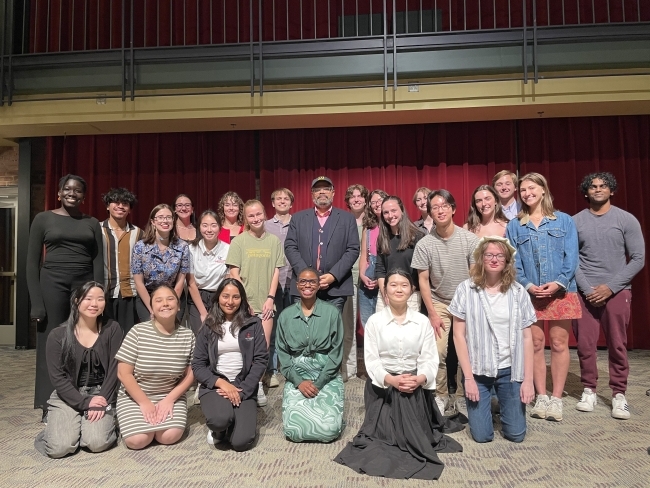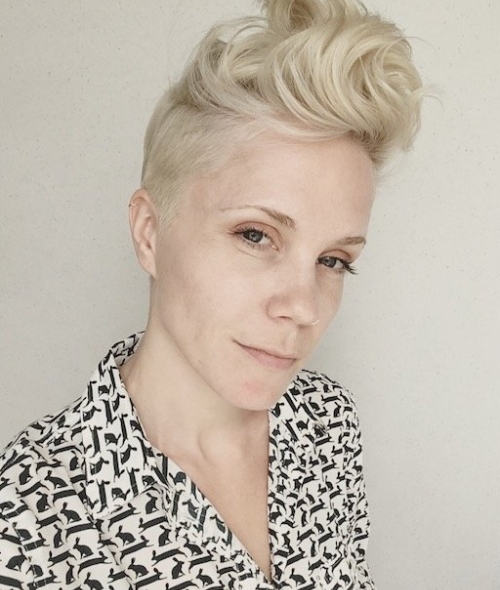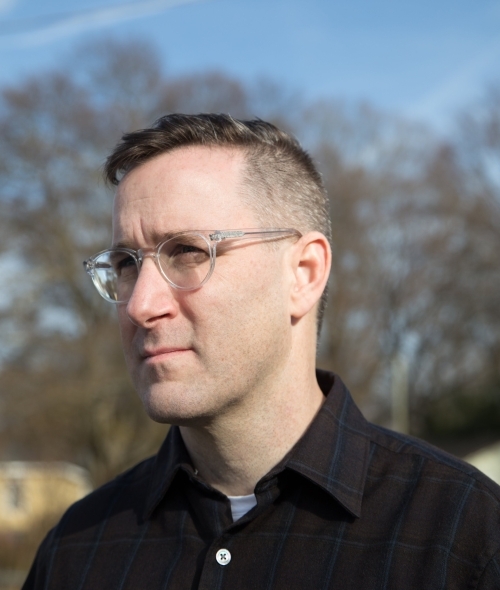Annual Student Writing Awards
Davidson College Writing Competitions
The Department of English urges all students and all years to submit your best work to our annual writing competitions: the R. Windley Hall, Charles Lloyd, and Vereen Bell competitions, and the newest named award, the Gibson Prize for Scholarly Writing.
Each winning entry is selected by a distinguished external judge.

Photo by Emily Drew, James K. Batten Professor of English
Fiction
Awarded to the best work of fiction by a Davidson student. Submit up to eight pages (if excerpted, indicate so) of any story written in 2024-2025. More than one story may be submitted, but the total page count may not exceed eight. If excerpted, say so.
Creative Nonfiction
Awarded to the best work of creative nonfiction by a Davidson student in any discipline written in 2024-2025. The total page count may not exceed eight. If excerpted, say so.
Poetry
Awarded to the best poetry by a Davidson student. Submit up to eight poems written in 2024-2025. The total page count may not exceed eight.
Scholarship
Awarded to the best scholarly essay written by a Davidson student in any discipline in 2024-2025. The total page count may not exceed eight. If excerpted, say so.
Guidelines
- Submit up to eight pages in a category.
- Work may have been written for any class, or on your own.
- All work must be double-spaced.
- You may enter 2 contests: one in creative writing (either fiction, creative nonfiction or poetry), and another in scholarly writing.
- All students submitting to these competitions must be available to attend the awards on Thursday, April 10 at 5 p.m. For questions about this requirement, contact Mark Riley at mariley@davidson.edu.
The deadline for submissions is Monday, March 31 by 10 p.m.
Meet the Judges

Yona Harvey
Poetry Submissions Judge
Yona Harvey is the author of You Don’t Have to Go to Mars for Love, which received the 2020 Award in Poetry from The Believer magazine. Hemming the Water, her first book of poems, was the winner of the Kate Tufts Discovery Award from Claremont Graduate University and a finalist for the Hurston/Wright Award. She received the Inaugural Lucille Clifton Legacy Award in Poetry from St. Mary’s College of Maryland and served as Poet In Residence for the 2018 Queensland Poetry Festival in Brisbane, Australia. She was awarded a 2021-2022 Japan – U.S. Friendship Commission Fellowship and a 2020 Howard Fellowship from the George A. and Eliza Howard Foundation. Between the publication of her two poetry books, Harvey co-wrote Marvel’s World of Wakanda, earning an Eisner Award for best limited series, and co-wrote the comic book series Black Panther & the Crew. She lives in Northampton, Massachusetts where she is the Tammis Day Professor of Poetry at Smith College.
Yona Harvey will give a reading at 7:00 p.m. on April 10 in the Alvarez-Smith 900 Room of the Knobloch Campus Center.

Sarah Perry '04
Creative Nonfiction Submissions Judge
Sarah Perry is a memoirist and essayist who writes about love, food culture, body image, trauma, gender-based violence, queerness, and the power dynamics that influence those concerns. She currently teaches in the graduate program in Creative Writing at the Colorado State University. She is the author of the memoir After the Eclipse: A Mother’s Murder, a Daughter’s Search, which was named a New York Times Book Review Editors’ Choice, a Poets & Writers Notable Nonfiction Debut, and a Barnes and Noble Discover Great New Writers pick. Her essay collection, Sweet Nothings: Confessions of a Candy Lover, is available from Mariner/HarperCollins as of February 2025.
Sarah Perry will be teaching courses in creative nonfiction at Davidson College in Spring of 2026 as the McGee Distinguished Professor of Creative Writing.

Jeff Jackson
Fiction Submissions Judge
Jeff Jackson is a novelist, playwright, and film curator. His first novel Mira Corpora was a Finalist for the LA Times Book Prize, and was named “Book of the Year” by Salon, Slate, and The New Statesman. His novella Novi Sad was chosen as “Best Book of 2016” in Vice, Lit Reactor, and Entropy. His second novel Destroy All Monsters was published by Farrar Straus & Giroux and received rave reviews in The New York Times, Washington Post, LA Times, and NPR. The Pitchfork website chose it as “Music Book of the Year.” His work has received praise from Don DeLillo, Dennis Cooper, Eimear McBride, and Janet Fitch and been translated into several languages.
He has written six plays for the Obie Award winning Collapsable Giraffe theater company in New York City, including Dream of Red Chamber: Performance for Sleeping Audience which debuted in Times Square. He’s taught film history and screenwriting at UNCC and Davidson. As film curator, he’s been awarded two grants from the National Endowment of the Arts. He founded the NoDa Film Festival, which won Creative Loafing’s “Best Film Series.” His New Frequencies series later won “Best Arts Programming” from Charlotte Magazine. Queen City Nerve recently chose his current Wavelengths film program as the city’s “Best New Arts Series.”
Jeff Jackson will be teaching a number of film and screenwriting courses at Davidson College in the 2025-2026 schoolyear.

Jonah Johnson
Scholarly Submissions Judge
Jonah Johnson teaches at Harvard College, where he is a Head Preceptor in the Writing Program and the Assistant Director for Writing Pedagogy at the Derek Bok Center for Teaching and Learning. He received his PhD in Comparative Literature and German Studies from the University of Michigan, and his BA in Ancient Greek Language and Literature from Oberlin College. He recently completed the Petits Fours, an epic poem set in (and over against) the Western canon.